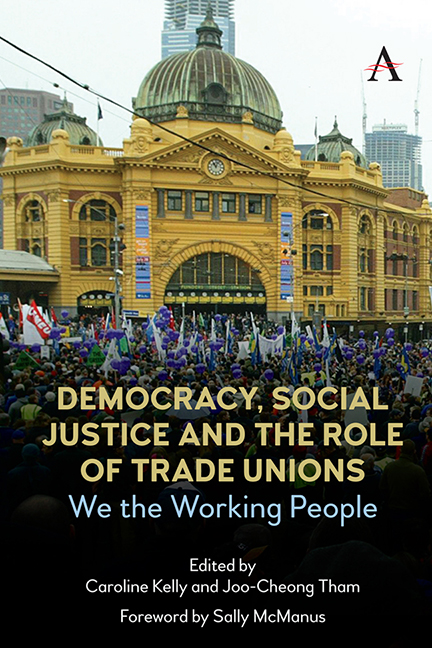Book contents
- Frontmatter
- Contents
- Foreword
- Acknowledgements
- Chapter 1 Democracy and Social Justice as Organising Principles
- Chapter 2 Economic Democracy, Workers and Unions
- Chapter 3 Nobody Owns the Future
- Chapter 4 Regulatory Approaches to the Internal Affairs of Trade Unions in Australia: From Democratic Control to Corporate Accountability
- Chapter 5 Trade Unions and the Regulation of Election Funding: Between Libertarianism and Egalitarianism
- Chapter 6 Trade Unions and Precarious Work: In Search of Effective Strategies
- Chapter 7 ‘Is There an App for That?’ Worker Representation, Unions and the Gig Economy
- Chapter 8 Temporary Migrant Workers and Trade Unions in Australia: A Complex Relationship
- Chapter 9 Unions, Fossil Fuel Exports and a Just Transition
- Chapter 10 Trade Agreements, Labour Rights and Democracy
- Chapter 11 Trade Unions, Labour Law and Democratic Socialism: The COVID-19 Crisis in the United Kingdom
- Notes on Contributors
- Index
Chapter 10 - Trade Agreements, Labour Rights and Democracy
Published online by Cambridge University Press: 18 November 2021
- Frontmatter
- Contents
- Foreword
- Acknowledgements
- Chapter 1 Democracy and Social Justice as Organising Principles
- Chapter 2 Economic Democracy, Workers and Unions
- Chapter 3 Nobody Owns the Future
- Chapter 4 Regulatory Approaches to the Internal Affairs of Trade Unions in Australia: From Democratic Control to Corporate Accountability
- Chapter 5 Trade Unions and the Regulation of Election Funding: Between Libertarianism and Egalitarianism
- Chapter 6 Trade Unions and Precarious Work: In Search of Effective Strategies
- Chapter 7 ‘Is There an App for That?’ Worker Representation, Unions and the Gig Economy
- Chapter 8 Temporary Migrant Workers and Trade Unions in Australia: A Complex Relationship
- Chapter 9 Unions, Fossil Fuel Exports and a Just Transition
- Chapter 10 Trade Agreements, Labour Rights and Democracy
- Chapter 11 Trade Unions, Labour Law and Democratic Socialism: The COVID-19 Crisis in the United Kingdom
- Notes on Contributors
- Index
Summary
Any discussion of trade agreements, labour rights and democracy must begin with an account of current trade policy. The dominant version of trade policy, part of a suite of economic policies known as neoliberalism or the Washington consensus practised by successive Australian governments, has been brought into question from critics on both the right and left of the political spectrum, and most recently by the COVID-19 pandemic.
Neoliberal trade policy argues that a one-size-fits-all elimination of tariffs and other trade barriers by all countries will increase trade and investment and reduce prices for consumers in a globalised competitive market that will eventually raise living standards for all. Each country should specialise in exporting its lowest cost products or services, import everything else at the lowest possible prices as well as have zero tariffs, no active industry policies and minimal government regulation. This results in global production chains in which national economies are narrowly specialised and governments compete for global investment, leading to what some have called a race-tothe-bottom on labour and environmental standards. This model has been increasingly criticised by economists dealing with real-world outcomes, and by unions concerned with both workers’ rights and social and environmental justice.
Critics of neoliberal trade policies point to the limitations of the basic assumptions of early-nineteenth-century neoclassical comparative advantage theory (e.g. that all resources are used in production, that capital is immobile) most of which do not apply to real-world twenty-first century economies. Historical studies question whether the application of neoliberal trade policies have delivered promised economic development in many low-income countries, or whether they have instead contributed to global inequality. They argue that the established industrialised countries, and most successful developing economies, achieved their own industrial development through selective tariffs and active industry policies, before negotiating lower tariffs and other barriers. The imposition of strict neoliberal policies on low-income countries amounts to ‘kicking away the ladder’ to economic development. Studies of more recent regional and bilateral trade agreements criticise their expansion into non-tariff areas of law and policy normally decided through national democratic processes.
- Type
- Chapter
- Information
- Democracy, Social Justice and the Role of Trade UnionsWe the Working People, pp. 171 - 190Publisher: Anthem PressPrint publication year: 2021

